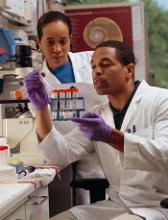More Americans are viewing clinical trials in a positive light, according to a survey commissioned by Research!America and the Association of Clinical Research Organizations (ACRO).
The results of the survey, which included 1000 participants and was conducted this month, reveal a shift in public attitudes about clinical trials since a similar survey was commissioned in 2013.
Thirty-seven percent of respondents involved in the current survey said they would “very likely” enroll in a clinical trial if their doctor recommended it. This represents an 11% increase from 2013.
Eighty-four percent of current survey respondents said they are willing to share personal health information, assuming that appropriate privacy protections are in place, so researchers can better understand diseases and develop new ways to prevent, treat, and cure them. This is a 10% increase from 2013.
When asked how much they admire people who volunteer for clinical trials, 46% of current respondents said “a great deal,” which is a 9% increase from 2013.
“More and more Americans appear to recognize the value of clinical trials—a very positive sign—but stubborn barriers to participation remain in place,” said Mary Woolley, president and CEO of Research!America.
“Development of incentives to drive more discussions between patients and healthcare professionals about the importance of participating in trials could encourage both ill and healthy individuals to view this as a routine health behavior.”
“We are pleased to have joined with Research!America in commissioning this important survey and gratified that the public’s knowledge of and attitudes toward clinical trials have moved in positive directions since 2013,” said Doug Peddicord, executive director of ACRO.
“The option to participate in a clinical trial, when appropriate, should be a routine part of the healthcare encounter, and ACRO will continue to work with Research!America and others to spread that message to doctors and patients alike.”
Survey results
The survey of 1000 US adults was conducted by Zogby Analytics for Research!America and ACRO in July 2017. The margin of error is +/- 3.1 percentage points.
Ninety percent of survey respondents said clinical trials are important to advancing science, and 87% said trials are important to improving the nation’s health. Seventy-five percent said taking part in clinical trials is as valuable to the US healthcare system as giving blood.
Eighty-six percent of respondents said healthcare professionals should discuss clinical trials with patients diagnosed with a disease as part of their standard care.
And 44% of respondents said clinical trial participation should be a routine health behavior, whether a person is healthy or ill, similar to getting an annual checkup with a healthcare provider.
Men (48%) were significantly more likely than women (39%) to say trial participation should be routine. A larger percentage of 18- to 29-year-olds (53%) and 30- to 49-year olds (48%) were in favor of routine trial participation, compared to people ages 50 to 64 (38%) and those 65 and older (34%).
Eighty percent of respondents said they had heard of a clinical trial, and 18% said they or someone in their family had participated in one.
Seventy-four percent of respondents said they would participate in a clinical trial if asked by someone they trust.
However, respondents were split on whether it’s important for everyone to take part in a clinical trial if asked. Forty-four percent said it is important, 45% disagreed, and 12% were not sure.
More than half of respondents (55%) said people don’t participate in clinical trials because of lack of awareness and information, 43% said it’s because trials are viewed as “too risky,” 41% said it’s due to a lack of information about the process, 38% said it’s due to a lack of trust, and 34% said it’s due to the risk of adverse health effects.
Nearly two-thirds of respondents (64%) said a doctor or healthcare provider is a reliable source for clinical trial information.
Respondents said doctors and other healthcare providers (44%), followed by the government (23%), have the greatest responsibility in educating the public about clinical trials. However, 74% said no healthcare professional has ever talked to them about medical research.
Seventy-two percent of respondents said they would be likely to use technology such as apps and monitoring devices to share their personal health data for clinical research.
Eighty-eight percent said clinical trial participants should have access to trial results. And 47% said they would like having clinical trial information/data/results delivered through their phone.


